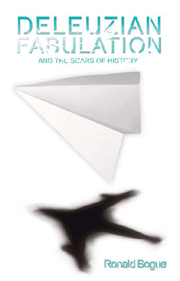Book contents
- Frontmatter
- Contents
- Acknowledgements
- Introduction
- 1 The Concept of Fabulation
- 2 Becoming-Prophet: Zakes Mda's The Heart of Redness
- 3 Becoming-Child, Becoming-Untouchable: Arundhati Roy's The God of Small Things
- 4 Becoming-Memory: Roberto Bolaño's Amulet
- 5 Becoming-Woman, Becoming-Girl: Assia Djebar's So Vast the Prison
- 6 Becoming-Fish: Richard Flanagan's Gould's Book of Fish
- Conclusion
- Bibliography
- Index
- Miscellaneous Endmatter
6 - Becoming-Fish: Richard Flanagan's Gould's Book of Fish
Published online by Cambridge University Press: 12 September 2012
- Frontmatter
- Contents
- Acknowledgements
- Introduction
- 1 The Concept of Fabulation
- 2 Becoming-Prophet: Zakes Mda's The Heart of Redness
- 3 Becoming-Child, Becoming-Untouchable: Arundhati Roy's The God of Small Things
- 4 Becoming-Memory: Roberto Bolaño's Amulet
- 5 Becoming-Woman, Becoming-Girl: Assia Djebar's So Vast the Prison
- 6 Becoming-Fish: Richard Flanagan's Gould's Book of Fish
- Conclusion
- Bibliography
- Index
- Miscellaneous Endmatter
Summary
Richard Flanagan is one of Australia's leading writers, whose five novels have gained increasing attention over the last decade. A fifth-generation Tasmanian, his first three novels, Death of a River Guide (1997), The Sound of One Hand Clapping (1998) and Gould's Book of Fish. A Novel in Twelve Fish (2001), all focused on Tasmanian characters and themes. His 2006 work, The Unknown Terrorist, told the story of a pole dancer in Sydney who is mistakenly identified as a terrorist. In his most recent novel, Waiting (2009), Flanagan has returned to his concentration on Tasmanian subjects, fashioning a narrative that taps the rich vein of nineteenth-century Tasmanian history that he had earlier utilised in Gould's Book of Fish.
Among his novels, perhaps Gould's Book of Fish has drawn the widest range of responses, from one critic's characterisation of it as ‘a monstrosity of a book’, to another's description of it as ‘remarkable’, ‘astonishing’, ‘a wondrous phantasmagorical meditation on art and history and nature’. Detractors and supporters alike recognise that the novel is playful, inventive, ambitious in scope, convoluted in plot, filled with comic exaggeration, satiric grotesques, improbable events and literary allusions. In part, the divergent responses among critics merely reflect differences of taste, but a common misconception among its detractors is that the novel is primarily an exercise in postmodern metafiction, a demonstration of the solipsistic reflexivity of language.
- Type
- Chapter
- Information
- Deleuzian Fabulation and the Scars of History , pp. 173 - 222Publisher: Edinburgh University PressPrint publication year: 2010



